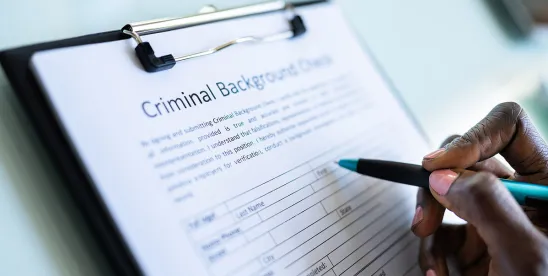On cross-appeals from a granted Fed. R. of Civ. Pro. 12(c) motion on subject matter eligibility, the US Court of Appeals for the Federal Circuit found that a patent directed to a method for “assist[ing] an investigator in conducting a background investigation” did not claim patent-eligible subject matter, but that the mere assertion of the patent did not render the case “exceptional” for the purposes of attorneys’ fees. Miller Mendel, Inc. v. City of Anna, Texas, Case No. 22-1753 (Fed. Cir. July 18, 2024) (Moore, C.J.; Cunningham, Stoll, JJ.)
Miller Mendel sued the City of Anna, Texas, for infringement of claims directed to software for managing pre-employment background investigations based on the Anna police department’s use of the Guardian Alliance Technologies (GAT) software platform. Miller Mendel’s complaint asserted “at least claims 1, 5, and 15” of the patent, each of which generally recited a “method for a computing device with a processor and a system memory to assist an investigator in conducting a background investigation” comprising the steps of receiving data identifying the applicant, storing the data, transmitting an applicant hyperlink to the applicant’s email address and receiving an applicant’s response.
Anna moved for judgment on the pleadings, alleging that the patent claims were ineligible for patent protection under 35 U.S.C. § 101. After the district court granted the motion, Miller Mendel filed a motion for reconsideration, arguing that the district court lacked jurisdiction to invalidate any unasserted patent claims. The district court denied the reconsideration motion but clarified that its decision was limited to asserted claims 1, 5 and 15. Anna also filed a motion for attorneys’ fees, which the district court denied, finding that the case was not exceptional. Miller Mendel appealed the § 101 issue, and Anna cross-appealed on the unasserted claims and attorneys’ fees issues.
The Federal Circuit first addressed Miller Mendel’s argument that the district court erred in relying on a declaration filed by Anna in ruling on the Rule 12(c) motion. The Court acknowledged that a Rule 12(c) motion must be treated as one for summary judgment if matters outside the pleadings are presented to and not excluded by the court. However, the district court explained that the declaration was not relevant to its decision, and it did not rely on any material outside the pleadings in its § 101 analysis. Thus, the Federal Circuit found that any error in failing to explicitly exclude the declaration was harmless.
Turning next to the patent eligibility analysis, the Federal Circuit agreed with the district court that under Alice step one, the asserted claims were directed to the abstract idea of performing a background check. The claims and specification emphasized that the invention was a system to “help a background investigator more efficiently and effectively conduct a background investigation” by “automating a majority of the tasks of a common pre-employment background investigation so that fewer hardcopy documents are necessary.” In other words, the problem facing the inventor was the abstract idea of performing background checks more efficiently – not an improvement to computer technology. In making its determination, the Court rejected Miller Mendel’s argument that the claims could not be directed to an abstract idea because certain limitations, such as transmitting hyperlinks by email, could not be accomplished in the mind or by pen and paper. The Court explained that “the inability for the human mind to perform each claim step does not alone confer patentability.”
At Alice step two, the Federal Circuit found that the claims did not contain elements that transformed the abstract idea into a patent-eligible application. The Court found that the limitations merely recited well-understood, routine and conventional activities, either by requiring conventional computer activities and components or by using routine data-gathering steps. The Court noted that the specification emphasized that the invention only required “already available computers” performing “already available basic functions.”
The Federal Circuit then addressed Anna’s argument concerning the “unasserted” patent claims, which were originally encompassed in the complaint’s broad assertion of “at least” claims 1, 5 and 15. In declining to hold the unasserted claims invalid or remand to the district court for such a finding, the Federal Circuit explained that the district court did not have jurisdiction over those claims because Miller Mendel had narrowed the claims at issue to claims 1, 5 and 15 in its response to the Rule 12(c) motion. The Court further rejected Anna’s argument that Miller Mendel should have narrowed the claims at issue before Anna filed its Rule 12(c) motion.
Finally, the Federal Circuit found that the district court did not abuse its discretion in denying Anna’s motion for attorneys’ fees under 35 U.S.C. § 285, even though the claims were found invalid. According to the Federal Circuit, the district court had acted within its discretion in finding that Miller Mendel was entitled to believe that the patent was valid after it was examined and allowed by the USPTO. The Court noted that while Miller Mendel’s opposition to the Rule12(c) motion was not compelling, it did not rise to the level of unreasonable or vexatious. The Federal Circuit thus affirmed the district court’s judgment and the denial of attorneys’ fees.
Practice Note: Throughout its § 101 analysis, the Federal Circuit quoted from portions of the specification and acknowledged that the claimed invention concerned a system for “automating” everyday tasks using “already available” computer equipment and functions. Patent practitioners should be mindful about the language used in describing a claimed invention as it may be construed as conceding that an invention is directed to patent-ineligible subject matter.



 />i
/>i
